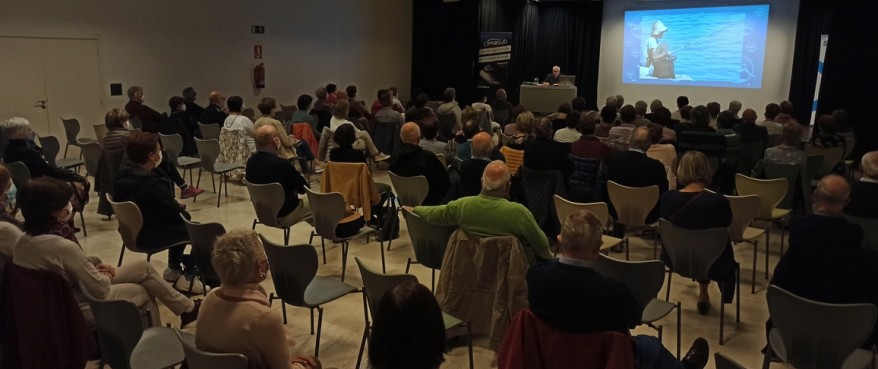This site uses cookies to offer themselves a better service. If you continue to browse consider acceptable for use.

On 2 and 3 November we attended the conference "The fish we eat and other animals", given by our colleague Luis Martínez, as part of the activities organised by the Helduen Hitza Association.
We began with the projection of the short films...
The Mediterranean coral reef : Juan Sempere-Valverde : 11 minutes : Strait of Gibraltar and Alboran Sea The Mediterranean Sea is one of the most biodiverse regions in the world, but also one of the most threatened by human activity. In its waters, age-old traditional activities such as Almadraba fishing are still carried out. However, this environmental and cultural wealth is today threatened by the convergence of multiple factors.
I the sea | José Carlos Rando Lara | Mediterranean (Marinas del Este and Cantarrijan, Costa Granadina) The sea speaks in the first person and invites us to get to know the enormous diversity that inhabits it and reminds us how vulnerable and fragile it is.
A sea of plastics : Enrique Talledo Ruiz : 5 minutes : Cantabrian Sea *** Prize for best video with ecological denunciation One of the most serious problems on the planet is plastic pollution. Many animals end up dying after ingesting these remains dumped by humans. If our way of acting does not change soon there will be more plastics than fish in our oceans and our health will be seriously affected.
Caila | Isaias Cruz Irujo | Basque Coast *** Prize for best video with ecological denunciation. Caila, our neighbour, as unknown as she is misunderstood, spends her first years of life growing up on our coasts, facing both the challenges of life in the ocean and those presented to her by humans.
The second part consisted of a presentation for the 150 people who attended the two conferences, in order to transmit the current critical situation of the health of the fish that often reaches our plates. The main points were the following:
Origin and type of extraction
Type of life and curiosities
What fishmongers offer
Parasites, allergies and heavy metals.
Consumption recommendations and seasons.
How to recognise fresh fish.
Contamination and its consequences, microplastics.
Consumption campaigns, overfishing and depletion.
Helduen Hitza is a non-profit association for people over 55. It was created in 2003 by 38 people from the Matía Foundation's School of Experience. We have now exceeded 450 people.
These men and women who were part of a new generation of older people, at the end of the annual course of the school of experience, see and feel the need to continue participating and expanding in a process of LIFELONG LIFELONG LEARNING, which provides them with a greater and better aging, active, healthy, cultural and participatory in our society, with the aim of improving knowledge, skills and attitudes with personal, civic and social perspectives.
More information at: www.helduenhitza.com
On 2 and 3 November we attended the conference "The fish we eat and other animals", given by our colleague Luis Martínez, as part of the activities organised by the Helduen Hitza Association.
We began with the projection of the short films...
The Mediterranean coral reef : Juan Sempere-Valverde : 11 minutes : Strait of Gibraltar and Alboran Sea The Mediterranean Sea is one of the most biodiverse regions in the world, but also one of the most threatened by human activity. In its waters, age-old traditional activities such as Almadraba fishing are still carried out. However, this environmental and cultural wealth is today threatened by the convergence of multiple factors.
I the sea | José Carlos Rando Lara | Mediterranean (Marinas del Este and Cantarrijan, Costa Granadina) The sea speaks in the first person and invites us to get to know the enormous diversity that inhabits it and reminds us how vulnerable and fragile it is.
A sea of plastics : Enrique Talledo Ruiz : 5 minutes : Cantabrian Sea *** Prize for best video with ecological denunciation One of the most serious problems on the planet is plastic pollution. Many animals end up dying after ingesting these remains dumped by humans. If our way of acting does not change soon there will be more plastics than fish in our oceans and our health will be seriously affected.
Caila | Isaias Cruz Irujo | Basque Coast *** Prize for best video with ecological denunciation. Caila, our neighbour, as unknown as she is misunderstood, spends her first years of life growing up on our coasts, facing both the challenges of life in the ocean and those presented to her by humans.
The second part consisted of a presentation for the 150 people who attended the two conferences, in order to transmit the current critical situation of the health of the fish that often reaches our plates. The main points were the following:
Origin and type of extraction
Type of life and curiosities
What fishmongers offer
Parasites, allergies and heavy metals.
Consumption recommendations and seasons.
How to recognise fresh fish.
Contamination and its consequences, microplastics.
Consumption campaigns, overfishing and depletion.
Helduen Hitza is a non-profit association for people over 55. It was created in 2003 by 38 people from the Matía Foundation's School of Experience. We have now exceeded 450 people.
These men and women who were part of a new generation of older people, at the end of the annual course of the school of experience, see and feel the need to continue participating and expanding in a process of LIFELONG LIFELONG LEARNING, which provides them with a greater and better aging, active, healthy, cultural and participatory in our society, with the aim of improving knowledge, skills and attitudes with personal, civic and social perspectives.
More information at: www.helduenhitza.com
Comentarios
Write your comment